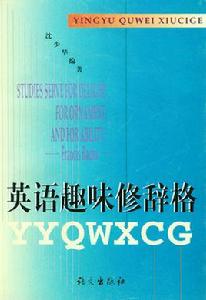按構成分類
詞義修辭格
詞義修辭格 (Lexical Rhetorical Devices)主要是指藉助語義的聯想和語言的變化等特點創造出來的 修辭手法。大學英語中常見的詞義修辭格有以下幾種:
1. Simile 明喻
與漢語的明喻基本相同,是以兩種具有相同特徵的事物和現象進行對比,表明本體和喻體之間的相似關係。常用來表示明喻的喻詞有like, as, as if, as though等。如:
Learning is like rowing upstream; not to advance is to drop back. 學如逆水行舟,不進則退。
“How like the winter hath my absence been” or “So are you to my thoughts as food to life” (Shakespeare).
如 “我的離開好象是冬天來臨” 或 “你對我的思想就象食物對於生命一樣重要” (莎士比亞)
My love's like a red, red rose. 我的愛人像一朵紅紅的玫瑰花。
The man can't be trusted. He is as slippery as an eel. 那個人不可信賴。他像鰻魚一樣狡猾。
He jumped as if he had been stung.他像被蜇了似的跳了起來。
Childhood is like a swiftly passing dream. 童年就像一場疾逝的夢。
2. Metaphor 暗喻
暗喻也是一種比喻, 但不用比喻詞, 因此被稱為"縮減了的明喻(a compressed simile)"。它是根據兩個事物間的某些共同的特徵, 用一事物去暗示另一事物的比喻方式。如:
And yet, while most of us are only too ready to apply to others the cold wind of criticism, we are somehow reluctant to give our fellows the warm sunshine of praise.
(大學英語第二冊,Unit 10, Profits of Praise)但是,儘管我們中的很多人太容易給別人批評的冷風,卻不知何故不願意給我們的同伴讚揚的陽光。
(該句中,將criticism比喻成cold wind,將praise比喻成warm sunshine,但是未使用任何比喻詞,因此為暗喻。)
He has a heart of stone. 他有一顆鐵石心腸。
The world is a stage. 世界是一個大舞台。
“a sea of troubles”“憂愁之海”
“All the world's a stage”(Shakespeare)
“整個世界一台戲”(莎士比亞)
3. Metonymy 轉喻
轉喻類似於漢語中的借代修辭,是通過相近的聯想, 借喻體代替本體,它根本不說出本體事物, 直接用比喻事物代替本體事物。用某一事物的名稱代替另外一個與它關係密切的事物的名稱,只要一提到其中一種事物,就會使人聯想到另一種。比如用the White House 代替美國政府或者總統, 用the bottle來代替wine 或者alcohol, 用the bar 來代替the legal profession,用crown代替king等。如:
Most Harvard graduates have read Emerson, Thoreau and Huxley.大多數哈佛畢業生都讀過愛默生、梭洛和赫胥黎(的作品)。
His purse would not allow him that luxury. 他的經濟條件不允許他享受那種奢華。
The mother did her best to take care of the cradle. 母親盡最大努力照看孩子。
He succeeded to the crown in 1848. 他在1848年繼承了王位。
4. Personification 擬人
擬人是把無生命的事物當作有生命的事物來描寫, 賦予無生命之物以感情和動作或是把動物人格化。如:
The night crawled slowly like a wounded snake, and sleep did not visit Rainsford.
黑夜像受傷的蛇一樣緩緩爬來,睡眠沒有造訪雷斯福特。
(句中"night"和"sleep"通過只適用於動物和人的"crawl"和"visit"兩個動詞被擬人化。)
The waves murmured, and the moon wept silver tears. 波浪低沉地嗚咽著,月亮撒下銀色的淚水。
(句中"waves"和"moon"通過一般只適用於人的"murmur"和"weep"兩個動詞被擬人化。)
Hunger sat shivering on the road 飢餓站在路上顫抖
Flowers danced about the lawn花兒在草地上翩翩起舞
My heart was singing. 我的心在歌唱。
This time fate was smiling to him. 這一次命運朝他微笑了。
The flowers nodded to her while she passed. 當她經過的時候花兒向她點頭致意。
The wind whistled through the trees. 風穿過樹叢,樹葉嘩嘩作響。
5. Hyperbole 誇張
誇張是一種故意言過其實,或誇大或縮小事物的形象,藉以突出事物的某種特徵或品格的修辭格。如:
Most Americans remember Mark Twain as the father of Huck Finn’s idyllic cruise through eternal boyhood and Tom Sawyer’s endless summer of freedom and adventure.
(高級英語第一冊,Unit 9 Mark Twain)
大多數美國人因知道哈克·費恩永恆的童年時代中充滿詩情畫意的旅程和湯姆·索亞在漫長的夏日裡自由自在歷險探奇的故事而記住了馬克·吐溫。( eternal和endless都是誇張用語, 表示哈克·費恩童年時期田園般的旅遊和湯姆·索亞夏日裡自由自在歷險探奇的故事都已成為永恆不朽之作。)
6. Euphemism 委婉語
委婉語是用婉轉、客氣的說法來代替直截了當的話,把原來顯得粗魯或令人尷尬的語言溫和、含蓄地表達出來。如:
His old friend is sleeping here —but forever. 他的老朋友長眠於此。(用sleep代替die一詞。)
用to fall asleep; to cease thinking; to pass away; to go to heaven; to leave us 代替to die
用senior citizens代替old people
用a slow learner或者an under achiever代替a stupid pupil
用weight watcher代替fat people
用mental hospital 代替madhouse或者asylum
用emotionally disturbed代替mad
用washroom, men's / women's room代替lavatory
用handicapped代替crippled
用low income brackets; underprivileged; disadvantaged 代替poor people
7. Irony 反語
反語就是說反話,即用反面的話來表達正面的意思。如:
On her birthday, the old lay merely received a check from her dear daughter, nothing more. What a lovely present!
這位老婦人生日時只收到了她親愛的女兒寄來的一張支票。這是多么好的禮物啊!(很明顯這不是一個讓人滿意的禮物。)
8. Oxymoron 矛盾修辭
矛盾修辭是將相互矛盾的概念和判斷巧妙地聯繫在一起,以便相互映襯,突出事物的特點,表達複雜的思想感情和意味深長的哲理。如:
sweet sorrow 憂喜參半(不是甜蜜的悲傷)
proud humility 不卑不亢(不是驕傲的謙卑)
victorious failure 雖敗猶榮(不是勝利的失敗)
結構修辭格
結構修辭格 (Syntactical Rhetorical Devices)是使用句子的特殊結構來加強語言效果的修辭手段。大學英語中常見的結構修辭格有以下幾種:
1. Antithesis 對偶
把結構相同、意義相關、語氣一致的兩組詞語或句子並列使用,稱為對偶。如:Man proposes, God disposes.謀事在人,成事在天。
“Hee for God only, shee for God in him”(John Milton)
“他只為上帝,她則為他心中的上帝”(約翰·米爾頓)
2. Parallelism 排比
排比是指使用兩個或兩個以上結構相同或相似的句子或句子成分表達相近或相關內容的修辭方法,其特點在於句式整齊、節奏分明、語言簡練、內容突出。如:
I came, I saw, I conquered. (Julius Caesar)我來到,我看見,我征服。(尤利烏斯·凱撒)
3. Rhetoric Question 反問
反問是用疑問的形式來表達確定的意思,不需要回答。如:If winter comes, can spring be far behind? (Shelly)冬天來了,春天還會遠嗎?(雪萊)
4.chiasmus交叉
交叉(chiasmus)是英語中一種常用的修辭方式。例如:Knowing something of everything and everything of something.(通百藝而專一長。)著名學者周海中教授曾在《論英語交叉結構》一文中對這一常用的修辭方式作了全面而深入的研究。他認為,這一修辭格具有很高的美學價值和積極的修辭作用。
音韻修辭格
音韻修辭格 (Phonetic Rhetorical Devices)是利用詞語的語音特點創造出來的 修辭手法。主要有以下兩種:
1. Onomatopoeia 擬聲
擬聲是詞模擬人及其他有生命或無生命物的聲音。如:The door banged shut. 門砰地一聲關上了。
2. Alliteration 頭韻
頭韻指重複出現首字母相同的單詞,起到突出重點、加深印象、平衡節奏的作用。如:
His dedication, determination and discipline impressed us deeply.他的投入、執著和自律深深打動了我們。
proud as a peacock
blind as a bat
safe and sound
“on scrolls of silver snowy sentences”(Hart Crane)
“寫滿銀色雪般句子的捲軸上”(哈特·克蘭)
Long and loudly little Lily laughed. 小莉莉長時間地、大聲地笑著。
The windows waved violently in the wind. 窗戶在風中劇烈地搖動。
The sun sank slowly. 太陽慢慢地下沉。
修辭格測試
測試題目
指出下列各句中使用的修辭格。
1. The operation may not succeed; it’s a gamble whether he lives or dies.
2. The little boy spent a miserable merry Christmas.
3. He can speak French as fast as a maid can eat blackberries.
4. I turned to my neighbors for help. But their houses were cold, closed and unfriendly.
5. I remember being vaguely annoyed when the gunman pulled me from the car by the hair. I remember the walk to the house. I remember the fear and anger in the gunman’s voice.
6. She gave me the impression of having more teeth, white and large and even, more than necessary for any practical purpose.
7. On this day we are very sorry to hear our dearest friend ceased to think.
答案及解析
1. Metaphor 句意:手術不一定成功,就像是對他生死的一場賭博。
分析:
該句中的gamble(賭博)一詞暗示手術成功沒有把握,就像是一場賭博。
2. Oxymoron 句意:這個男孩度過了一個悲喜交加的聖誕節。
分析:
miserable(痛苦的)和merry(快樂的)含義相矛盾,屬於矛盾 修辭手法。
3. Simile 句意:他說法語就像女僕吃黑莓一樣快。
分析:
句中通過比喻詞as將“他說法語”和“女僕吃黑莓”進行比較,說明他說法語速度之快。
4. Personification 句意:我請求鄰居幫忙。可是他們的房子門窗緊閉,看起來冷漠無情,一點也不友好。
分析:
該句通過cold, unfriendly這兩個一般只適用於人的形容詞將house這一無生命的存在物,描寫成和人一樣有感情色彩,使之人格化,表現了鄰居的冷漠無情。
5. Parallelism 句意:我記得當那個持槍歹徒扯著我的頭髮,從車裡把我拉出來時我隱約感到的惱火,我記得走向房子的那段路,我記得歹徒的聲音中流露出的恐懼和憤怒。
分析:
各句均以“I remember”開頭,句子對稱,文筆流暢,給讀者造成一種急促、緊張的氣氛。
6. Hyperbole 句意:她給我的印象是牙齒整齊,且又白又大,為數之多已超過任何實際需要。
分析:
該句中的more than necessary, 言過其實。通過這一誇張的描述,使一個貪婪好吃的女性形象躍然紙上。
7. Euphemism 句意:今天得知我們最親愛的朋友離我們而去,我們感到萬分難過。
分析:該句中用cease to think (停止思考)來替代die (死亡),使用委婉語使表達更加含蓄婉轉

